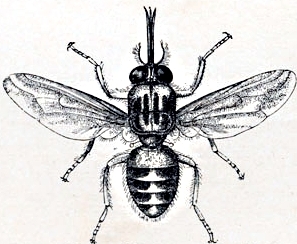 Arthropods such as insects can be devastatingly efficient pests and disease vectors, posing significant challenges to the agricultural and medical communities. Pesticides used to be a common solution to dealing with pests but, with more stringent environmental regulations on pesticides and increasing pest resistance to the chemicals, new solutions are required.
Arthropods such as insects can be devastatingly efficient pests and disease vectors, posing significant challenges to the agricultural and medical communities. Pesticides used to be a common solution to dealing with pests but, with more stringent environmental regulations on pesticides and increasing pest resistance to the chemicals, new solutions are required.
Many arthropods have evolved a symbiotic relationship with bacteria and this association could potentially be exploited to control pests and disease vectors. This biological control approach, called symbiont-based control strategies, would be preferable to chemical controls due to their lower environmental impact.
 In order to exploit the arthropod- bacterial symbiosis, more knowledge of the relationship is required. BMC Microbiology has published a supplement – Arthropod symbiosis: from fundamental studies to pest and disease management consisting of the latest interdisciplinary research in this field. The articles in the supplement look at bacterial symbiosis with pests such as the Anopheles mosquito that spreads malaria, tsetse fly that spreads sleeping sickness and the cereal weevil that devastates cereal crops.
In order to exploit the arthropod- bacterial symbiosis, more knowledge of the relationship is required. BMC Microbiology has published a supplement – Arthropod symbiosis: from fundamental studies to pest and disease management consisting of the latest interdisciplinary research in this field. The articles in the supplement look at bacterial symbiosis with pests such as the Anopheles mosquito that spreads malaria, tsetse fly that spreads sleeping sickness and the cereal weevil that devastates cereal crops.
Currently in their initial stages of development, symbiont-based control strategies have the potential to increase global health and food resources by removing arthropod disease vectors and agricultural pests.
Srimathy Sriskantharajah
Srimathy is the Executive Publisher for Parasites & Vectors, Malaria Journal and other microbiology/ infectious diseases journals at BioMed Central.
Latest posts by Srimathy Sriskantharajah (see all)
- Scientists of the future: Matteo Gregori discusses his research path into Arctic microbiology - 22nd February 2022
- Scientists of the Future: Rebecca Ansorge talks to us about her research on the gut microbiome - 10th February 2022
- Quiz: so you think you know biology? - 6th October 2018
Comments